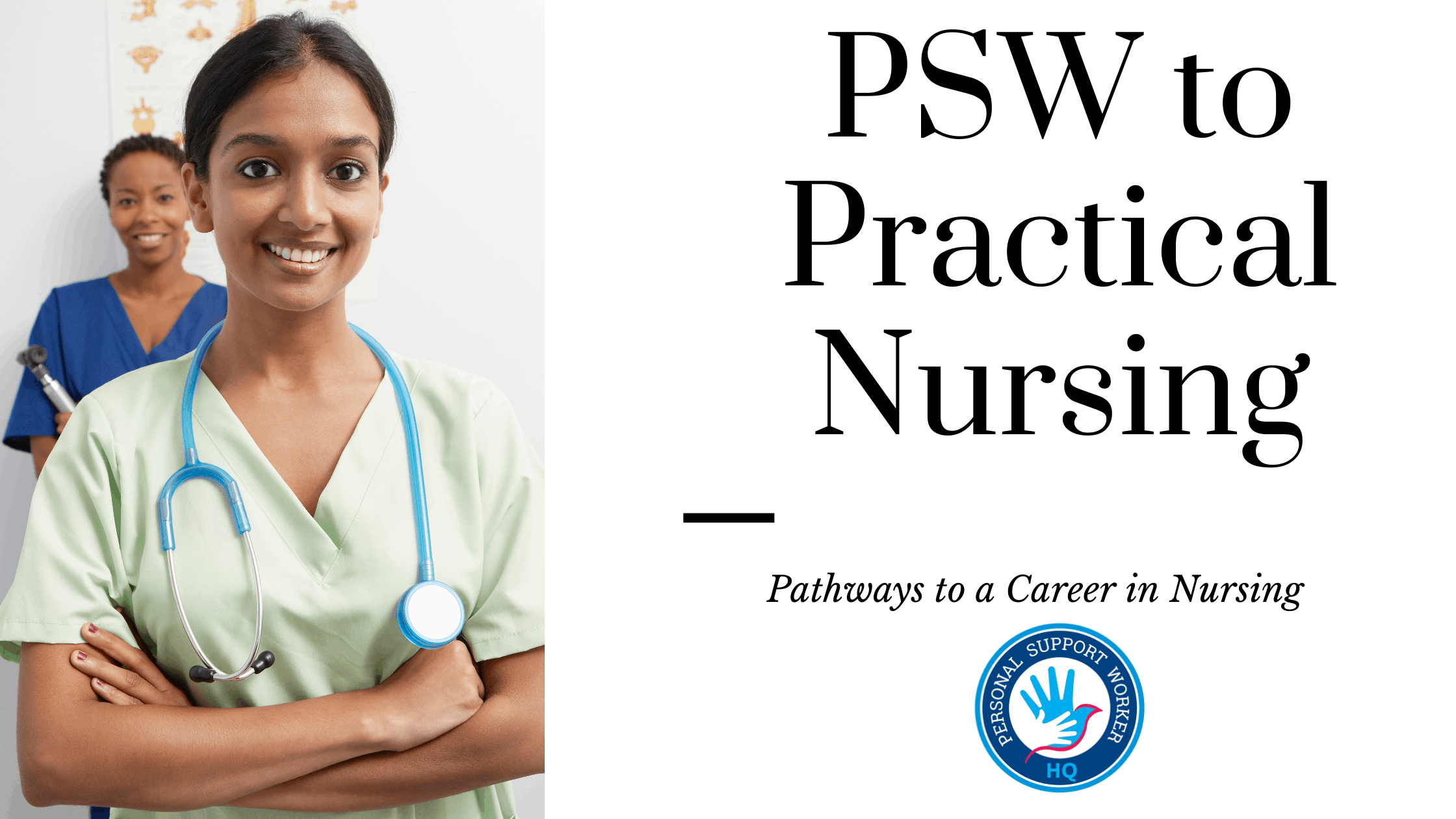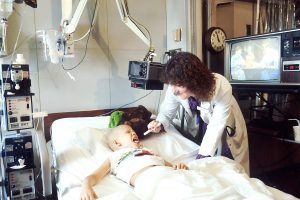
Are you a Personal Support Worker (PSW) and looking to become a Nurse?
If you answered yes…
you have come to the right place.
You will find all the details you need to upgrade from a PSW to a practical nurse.
There are many benefits of advancing your clinical practice.
Job opportunities for RPNs are becoming especially prevalent as the geriatric aging population in Ontario is growing, thus demonstrating a need for qualified nursing care in:
- acute care settings,
- community health agencies, and
- long-term care facilities.
The Government of Ontario is also actively supporting and funding the training and recruitment of 27,000 Registered Nurses (RNs), Registered Practical Nurses (RPNs), and PSWs.
As a Registered Practical Nurse, you will also be entitled to job benefits such as higher pay and greater job satisfaction.
Upon enrolling in a Practical Nursing (PN) program, those with a PSW certificate are usually given a credit.
There are many colleges that offer Personal Support Worker to Practical Nursing bridging programs.
In this article you’ll learn:
- Which colleges offer this program?
- The cost
- Duration
- Intake, and
- Direct links to college websites.
Subsequently, this article will equip you with valuable information that you will need in order to make an informed decision regarding enrolling in a bridge program.
Where are the Programs Offered?

Many institutions in Ontario offer continuing education and bridging programs for Personal Support Workers to enable them to become Registered Practical Nurses.
Following is a list of colleges that offer this bridging program in Ontario, Canada.
Mohawk College
This program is specifically designed for those who have completed a certified PSW course in order to advance into the second semester of the Practical Nursing program.
The program emphasizes collaborative learning alongside clinical training, theory, and lab work.
Following the completion of the Practical Nursing diploma program, graduates are eligible to take the Canadian Registered Practical Nurse Examination (CRPNE), administered by the College of Nurses of Ontario (CNO).
Admission Requirements
To apply for this Mohawk PSW to PN bridging program, you will need to:
- Submit proof of completion of Grade 12 English C or U,
- Grade 11 or 12 Mathematics C, M or U (M or U recommended),
- Grade 11 or 12 Sciences, and
- Evidence of completion of a Personal Support Worker Certificate program from an accredited Ontario college since 2006.
Once you meet the above requirements, you will also be asked to take the Health Occupation Aptitude Examination (HOAE) test with the Mohawk Pre-Admission Testing Centre for a $50 fee.
Please note that this is a very competitive program and you must apply as early as possible.
Cost
The estimated cost for the first year of the Practical Nurse program is $6,152.10.
Mohawk also offers specialized Practical Nurse training for Aboriginal communities. The cost of this program is $5,962.87 for one year.
Additional costs for both programs include pre-clinical placement clearance costs such as:
- hepatitis injections,
- CPR training,
- facial mask fitting, and
- police clearance.
There is no distance education program currently offered, but some non-nursing courses are available online.
For more details about the Practical Nursing (PSW to PN bridging stream) at Mohawk College, visit the Mohawk College website.
Fleming College
The courses are housed under the Fleming College Continuing Education & Online Learning program.
You must successfully complete the following bridging courses:
- Bridge PSW to PN filed placement
- Clinical Nursing Informatics
- Communications I (English I),
- Bridged Nursing Theory,
- Anatomy & Physiology,
- Math for Nursing, and
- Communications.
All these courses can be taken part-time however the PN program is a full-time day program offered only at the Sutherland Campus in Peterborough.
Upon completion of the bridging courses, you will be eligible for the second semester of the full-time PN program.
Courses are registered and paid for individually.
All courses take place on their Sutherland campus, cost $5.40 per course hour, and range from 15-60 hours. Courses, therefore, range between $ 104.70 and $ 418.80 each in total.
Find out more details about the Personal Support Worker bridging to Practical Nursing at Fleming College.
Algonquin College
***Please note that this program is currently on hold however you may qualify to be admitted directly into the Practical Nursing Program at Algonquin College. ***
This academic pathway can potentially allow PSW course graduates to immediately enter Level 2 of the Practical Nursing program.
Hence, it is classified as a pathway and not a program.
Students are required to complete a series of classes and if they are successful, will be permitted to apply to Level 2 of the Practical Nursing curriculum without having to take further high school classes or equivalences.
The pathway is designed to provide eligible students with a higher level of knowledge and practice through which they can potentially advance their nursing careers.
All applicants to this pathway:
- Must have the equivalent of one year of full-time practice hours as a PSW which totals 1750 hours.
- Are also expected to have a minimum of 30% of the hours in a Home for the Aged and/or Long Term Care agency.
Additionally,
- Applicants must also have a reference letter from a current or recent employer which describes their work experience.
- Applicants who have graduated from a community college must have a minimum GPA of 70% or have obtained a minimum of 70% in their Personal Support Worker program.
- Applicants who have completed their PSW program from a private college or Vocational High School must have 70% overall.
With an entry in May of each year, this program comprises the following courses:
- Communications,
- Introduction To Psychology,
- PSW to PN Nursing Theory and Seminar, and
- Fundamentals of Anatomy and Physiology for PSW to PN Bridge
Courses are to be taken individually for $374 to $389 each. The total tuition fee for the course is approximately $1470.
The course itself lasts one semester and practical nursing students are required to obtain at least 63% in all courses.
A minimum of 55% is required on the Health Occupations Aptitude Exam (HOAE) test which you will be required to take after completing the pathway.
Ten places in the Practical Nursing (PN) program are reserved for students who earn the highest marks with the remaining applicants being placed in a pool to be chosen for the course based on availability.
The program is offered at the school’s Woodroffe Campus.
Find out more details about the Algonquin College PSW to Practical Nursing pathway.
Conestoga College
Classes must be taken in a specific order as per guidelines.
This program is offered on a part-time basis with classes being offered one day per week. The bridging course at Conestoga College takes approximately two years to complete.
Some of the highlights of the program are:
- There is only 1 intake into the program that takes place in the winter term,
- Applications open in August of each year, and
- The deadline to apply to this program is in November.
Students who complete this bridging program will then be offered the opportunity to undertake the third semester of the PN program part-time.
There is also a possibility of transferring to full-time if space is available in the full-time program.
The fourth semester of the PN course contains a clinical element and must be taken full-time.
Therefore the bridging courses, in addition to the final two semesters of the PN program, will take between three to four years to complete.
The process might seem to be a bit confusing.
It is best to contact the program facilitator to get more information.
The current program contact is Karen Towler and you can email her at [email protected] if you have any questions.
Admission Requirements
Applicants must have:
- A Personal Support Worker Certificate from an Ontario accredited college,
- You must be currently employed as a Personal Support Worker,
- The following Ontario Secondary School courses (or equivalents), with a minimum cumulative average of 75% are required:
- Grade 12 compulsory English, C or U, or equivalent, OR Conestoga College Preparatory CommunicationsGrade 12 Mathematics, C or U, or equivalent, OR Conestoga College Preparatory MathematicsGrade 11 or 12 Biology, C or U, or equivalent, OR Conestoga College Preparatory BiologyGrade 11 or 12 Physics or Chemistry, C or U, or equivalent, or Grade 11 or 12 Science, OR Conestoga College Preparatory Physics or Preparatory Chemistry
As the program is offered on a part-time basis, course fees are individual and charged per class.
The course is offered at the school’s Doon Campus in Kitchener, Ontario.
Find out more details about the Personal Support Worker to Practical Nursing bridge.
In addition, we also collected all information you need to know if you are at the beginning of your PSW career. In short, these are the things you can find there:
Resources you need as a Personal Support Worker
On this page, you can find anything there is to know about how to become a personal support worker, how to succeed as one, and how to continue your education. This is the place to come to and look for all the PSW resources and information that you may need on your journey as a Personal Support Worker.
PSW job interview questions
If you’re determined to pass your next PSW interview with flying colors, we’re here to help. PSWHQ has put together a thorough online guide with PSW interview questions and appropriate sample answers to these questions that hit the target, and are concise and supportive.
Guide to finding PSW jobs
After you have decided to become a Personal Support Worker and completed the course you are now at a point to start looking for work. It is important that you explore all the jobs listed under different job titles, which is why you should go and find ultimate work.
We also help you find PSW job postings from chronic care hospitals, long-term care homes, and community and private health care settings.
Advertising with PSWHQ
Over the past few years, PSWHQ has achieved a dominant ranking in major search engines such as Google and Bing. As a result, we offer a limited number of advertising opportunities to individuals, colleges, companies, and organizations we see as a good fit for the unique audience of PSWHQ.
What Are You Waiting For?
There are so many opportunities for you as future healthcare workers to advance your career and there is absolutely no reason you should not.
Once you have determined the right kind of program to suit your lifestyle, you will find that the investment you make in one of these courses will greatly enhance your professional life.
Every attempt is made to ensure that information contained in this article is current and accurate. PSWHQ has provided this information in the best interests to inform the readers and is not liable for any actions taken by any party based on the information provided.
Image credit: “Nurse” used under a Creative Commons Attribution from waltstoneburner on Flickr.
FAQs
1. Can PSW become RPN in Ontario?
Yes, a PSW student can pursue a career as an RPN. A variety of continuing education and bridge programs are available at several institutions in Ontario to help you make the move from PSW to RN or RPN as smoothly and quickly as feasible. They take advantage of students’ past knowledge and education to assist them in learning a new set of skills while also maintaining their current employment.
2. What can I study after PSW?
You can study a variety of different things after PSW. If you are interested in the healthcare field, you could go on to become an occupational therapist or a physical therapist. If your interest is more in social work, you could go on to get your Master’s degree and be a counselor or psychotherapist.
3. Is an LPN the same as a PSW?
No, they are not the same. An LPN is a licensed practical nurse, and PSW stands for Personal Care Worker. These are two different professions.
4. Are PSW considered nurses?
Yes, they are considered nurses. They can work in a hospital setting or at home with patients who need assistance.
5. What is bridging program for nurses?
The Bridge to BSN program prepares students with enhanced skills and knowledge that will allow them to provide a higher degree of patient care in a range of healthcare settings after graduation. A fundamental component of nursing education is the development of the theoretical foundation for nursing practice, with an emphasis on the critical interrelationships between theory, practice, policy, and investigation.










hi there
i am currently doing psw job.i did my psw diploma from comuntiy college.now i want to upgrade my skill.please give me proper advise what should i do.i am looking operating room nursing program.can i do .a friend of mine she told me about this course .please help me to find a right direction thanks.my number is 905 320 2438 thanks.
Hello Sandipak,
Thank you for leaving a comment.
As a Personal Support Worker, there are many courses and programs you can pursue to further your education.
You can take short-term courses (these are often free). https://personalsupportworkerhq.com/continuing-education/
In order for you to become an OR Nurse, you have to complete the nursing program. After you have become a nurse (next step as a PSW will be to become a Practical Nurse), you can take OR certificate course.
Hope this helps.
Hi I am currently working in a hospital as an OR Assistant and ICU Assistant, which is more than a simple PSW on a regular floor. I’m a Certificated PSW looking upgrade to RPN but without wasting time or money. I read the review of the college and is pretty good. But I don’t understand what I have to take 1 course a week and spend 2 years doing something that I should finish in 1 or less. In that time I can complete the 2 years for RN or RT.I think we can find other solutions. Please help me and guide me to do right. If you need that I submit the documents that I have or other information just email me back. I hope I can hear from you and find the right solution. My phone number at home is
905-237-7962……you can leave me any message there. Thank you for everything …..AdrianaHi Adriana,
Thank you for your comment.
I understand bridging programs are lengthy. However, this is something the colleges have outlined and unfortunately go whatever criteria they have specified.
Good luck!
Avtar from PSWHQ
Does St Lawrence in Cornwall offer this
This use to be a bridging program in Seaforth on what happened to that
“Approve”
Shelsie…thanks for your comment.
Healthkick is based in Seaforth, Ontario. It offers healthcare related programs and offer services such as healthcare training and work placements.
Healthkick do not offer PSW to PN bridging and both these programs are offered separately.
Both these programs are offered in collaboration with Georgian college (http://www.georgiancollege.ca/).
The Personal Support Worker program is currently offered at the Seaforth and Zurich sites and meets the Ministry of Health & Long Term Care (MOHLTC) standard requirement for Personal Support Workers. Visit the following link for more details: http://www.healthkickhuron.ca/PSW.html
The Practical Nursing program is offered at the Huron site: 32B Centennial Drive, Seaforth, ON. This is a four year part-time program. Click on this (http://goo.gl/odL6ow) link for more details.
In my years working as an RN in a few nursing homes in Ontario I have see more than a few RPNs go the opposite direction. That is to choose to work as a PSW instead of an RPN at the facility. The people I spoke with that took this route all had the same rationale for doing so.
In many Long Term Care facilities the difference in pay for an RPN and a PSW was only about $1.00 to $2.00 per hour. As an RPN they had to pay an annual registration fee with the College of Nurses and as a PSW no such fee is required. The level of professional accountability as an RPN (a Regulated Healthcare Professional) was greatly higher than a PSW but was only scantly higher in salary. The need to administer medications and contact physicians directly for resident related drug and treatment orders was again a responsibility that offered severe repressions should an error be made that were not there as a PSW. There was a significant increase in so-called paperwork as an RPN than as a PSW and therefore a greatly decreased contact time with residents.
Jim…thanks for sharing your experience.
It is very interesting to see RPN’s choosing to work as PSW’s. The amount of “paperwork” and liability are definitely a strong hindrance especially when the compensation for added responsibility is meagre.
I believe, this is happening more in the community and Long-term care facilities.
In hospital settings, depending on the organization, the pay difference between PSW’s and RPN’s is $5 to $7.
I still believe RPN’s are not compensated fairly.
Their scope of practice has widened so much over the past few years such that RPN’s and RN’s share almost the same amount of responsibility. However, the pay difference is huge!
im studying at durham college the PSW, want to apply for RPN and im an international student having the degree of bachelors of nursing from india but im totally confused what should I do can you help me out?
Hi did you get to do the rpn course?? Can you update me on the procedure. I am currently in the same position
Janiek…there are several bridging programs available to gain entry into practical nursing programs. Please refer to the article above for further information.
Avtar
I am currently working at Palliative Care Hospice as a clinical health care aide, however I will be moving to Florida for a year. Will my designation as a Personal Support Worker be recognized there or will I need further education or certification in order to gain employment. Any information will be helpful.
Thank you, Cam.
Hi Cam…Kindly check with the local state/county, if they will recognize your Ontario PSW diploma.
One thing I’ll recommend is obtaining course descriptions and contents from the College where you got your PSW diploma from.
This can come in handy if you have to get an evaluation done.
All the best,
Avtar
Am currently doing my PSW in a private institution in Hamilton. I already started my clinical and finishing by end of February 2018. I will like to do the bridging course to RPN. Kindly advice on the steps to take.
Jola…Congratulations on choosing to become a Personal Support Worker.
It’s great that you have chosen to continue your studies to become a Nurse.
Here are a few colleges that offer PSW to RPN bridging programs:
Mohawk College PSW to Practical Nursing bridging program
George Brown PSW pathway to Practical Nursing
Fleming College PSW to Practical Nursing bridging program
Conestoga College PSW to PN bridging program
Algonquin College PSW to PN bridging program
will the mohawk rpn program accept a psw acredited certiicate that was from a psw bridging program? i was still required to do the exam!
Hello Lindsay…kindly check with Mohawk directly.
Here’s the direct link to the Mohawk PSW bridging program.
Hello,
I’m very interested in advancing my career from PSW to RPN. I’m a recent graduate from an accredited college with an 81% gpa. Any more information would be greatly appreciated.
Thank you
Elisabeth Little
Elizabeth…seems like you’ve done quite well in your PSW course and pursuing further education is going to be a great decision for you.
All the colleges that offer PSW to Nursing programs are listed in the article above. You can refer to any of the colleges that interest you for further information.
Let me know if you have any further questions.
All the best!
Graduated from nursing program in 2009 but was unsuccessful in CNO , how would I go about re-entering to obtain the license.
Hi
I am a 32 year old women and I have graduated from the person support worker program from George Brown College part time with honours. I graduated in 2009, I’ve been a psw now for 7 years. I want to upgrade to becoming a rpn. Will I still need to do the mandatory courses to get into the RPN program? Either at Seneca or George Brown College?
Thanks Terri Benson
Terry…Almost all colleges that offer PSW to RPN programs require you to do a bridging program.
At George Brown, you must do this Personal Support Worker Pathway to Practical Nursing program.
I’m not sure what the criteria is at Seneca.
You can connect with Nancy Caprara, the Practical Nursing (PN) program coordinator at Seneca to find out more.
She can be reached at 416.491.5050 ext. 55546 or via email at [email protected]
All the best!
When you say accredited colleges, does this mean only community colleges can qualify ? how about those graduated from Private career college?
Tina…Any college (public or private) can be accredited as long as they are registered and in good standing with the Superintendent of Private Career Colleges.
You can search for any registered college here.
Hi.
I am an international student who just gained admission to study PSW program at Evergreen College. Please i would like to know how well rated this institution is in Canada as i expected to see it on the list of top recognised institutions offering the PSW programme whose certification is highly recognised, perhaps you can help me make the right decision at this early stage. Secondly, i had planned coming to Canada with my 2 year old daughter, i was told by my agent that the system in Canada is flexible enough to have one go to work with their kid, however from my personal findings via the Internet i am not so confident my agent is right. Please do shed more light on this to enable me make adjustments if necessary. Thank you so much.
Bibi…All Private Career Colleges must be registered with the Ministry of Training, Colleges and Universities and the programs they offer must be approved by the superintendent of Private Career Colleges.
Evergreen College seems to be in good standing.
You can check the registration and approval status here.
The Ministry of Training, Colleges, and Universities regulates private career colleges under the Private Career Colleges Act, 2005 and associated regulations.
Under the Act, the government’s Superintendent of Private Career Colleges can issue Notices and Orders to colleges that are not conducting their business in accordance with the law.
You can check out the list of colleges that are not in good standing here.
As per working in Canada, this is something you have to discuss with an immigration expert who will be better able to guide you.
Hello sir! i am waiting my letter of acceptance in Fanshawe Collage, do they have bridging program for this course?Thank you.
Karen…I didn’t come across a bridging program at Fanshawe College.
Here’s a complete list of PSW and Nursing related programs they offer.
Click here to view.
Hi. I need your guidance. When the psw course is completely witgiythr one year, will I be able to apply for work permit? Will this program about me to apply for residence?
Regarding the residency, you would recommend a 1 or a 2 year program?
Thanks in advance
Stacey…I would suggest you consult an immigration expert for an answer to your question.
Hello my name is huma I did my course in 2010 and I am working as a PSW now I would like to upgrade my self as a RPN I know there is a lot of college my question is there anyway any colleges do part time or online because I can’t quite my job please advise me thanks
I wish Fanshaw offered the bridging program.
Is there any reason Sheridan college is not mentioned for the PSW bridge to PN? Is it good?
Maria…thank you for bringing up the Sheridan College PSW to PN bridging program. I completely missed it!
It’s a great program and is completely online.
I’ll add it to the list.
Avtar
Hello, Avtar,
Those are very helpful info. I just want to ask you, does these programs take into account of previous other education received in other field, for example, college level education of psychology or social work? Thank you very much.
Maggie…you will have to check with the college you are considering applying to see if they will grant you transfer credits for your previous education.
Avtar
I would like to up grade to rpn I got my psw in 2010 from Everest college (closed now) I have worked 12 years for a few work places and am currently working for 6 years with cbi. How would I go about becoming a nurse and which college would be your top choice. Thank you